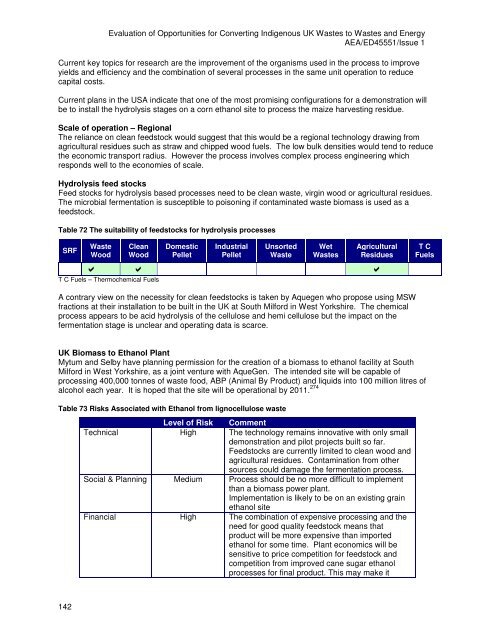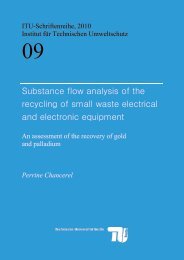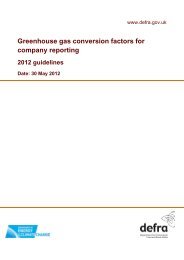to read the full report - Ecolateral by Peter Jones
to read the full report - Ecolateral by Peter Jones
to read the full report - Ecolateral by Peter Jones
Create successful ePaper yourself
Turn your PDF publications into a flip-book with our unique Google optimized e-Paper software.
142<br />
Evaluation of Opportunities for Converting Indigenous UK Wastes <strong>to</strong> Wastes and Energy<br />
AEA/ED45551/Issue 1<br />
Current key <strong>to</strong>pics for research are <strong>the</strong> improvement of <strong>the</strong> organisms used in <strong>the</strong> process <strong>to</strong> improve<br />
yields and efficiency and <strong>the</strong> combination of several processes in <strong>the</strong> same unit operation <strong>to</strong> reduce<br />
capital costs.<br />
Current plans in <strong>the</strong> USA indicate that one of <strong>the</strong> most promising configurations for a demonstration will<br />
be <strong>to</strong> install <strong>the</strong> hydrolysis stages on a corn ethanol site <strong>to</strong> process <strong>the</strong> maize harvesting residue.<br />
Scale of operation – Regional<br />
The reliance on clean feeds<strong>to</strong>ck would suggest that this would be a regional technology drawing from<br />
agricultural residues such as straw and chipped wood fuels. The low bulk densities would tend <strong>to</strong> reduce<br />
<strong>the</strong> economic transport radius. However <strong>the</strong> process involves complex process engineering which<br />
responds well <strong>to</strong> <strong>the</strong> economies of scale.<br />
Hydrolysis feed s<strong>to</strong>cks<br />
Feed s<strong>to</strong>cks for hydrolysis based processes need <strong>to</strong> be clean waste, virgin wood or agricultural residues.<br />
The microbial fermentation is susceptible <strong>to</strong> poisoning if contaminated waste biomass is used as a<br />
feeds<strong>to</strong>ck.<br />
Table 72 The suitability of feeds<strong>to</strong>cks for hydrolysis processes<br />
SRF<br />
Waste<br />
Wood<br />
Clean<br />
Wood<br />
Domestic<br />
Pellet<br />
Industrial<br />
Pellet<br />
Unsorted<br />
Waste<br />
Wet<br />
Wastes<br />
Agricultural<br />
Residues<br />
<br />
T C Fuels – Thermochemical Fuels<br />
A contrary view on <strong>the</strong> necessity for clean feeds<strong>to</strong>cks is taken <strong>by</strong> Aquegen who propose using MSW<br />
fractions at <strong>the</strong>ir installation <strong>to</strong> be built in <strong>the</strong> UK at South Milford in West Yorkshire. The chemical<br />
process appears <strong>to</strong> be acid hydrolysis of <strong>the</strong> cellulose and hemi cellulose but <strong>the</strong> impact on <strong>the</strong><br />
fermentation stage is unclear and operating data is scarce.<br />
UK Biomass <strong>to</strong> Ethanol Plant<br />
Mytum and Sel<strong>by</strong> have planning permission for <strong>the</strong> creation of a biomass <strong>to</strong> ethanol facility at South<br />
Milford in West Yorkshire, as a joint venture with AqueGen. The intended site will be capable of<br />
processing 400,000 <strong>to</strong>nnes of waste food, ABP (Animal By Product) and liquids in<strong>to</strong> 100 million litres of<br />
alcohol each year. It is hoped that <strong>the</strong> site will be operational <strong>by</strong> 2011. 274<br />
Table 73 Risks Associated with Ethanol from lignocellulose waste<br />
Level of Risk Comment<br />
Technical High The technology remains innovative with only small<br />
demonstration and pilot projects built so far.<br />
Feeds<strong>to</strong>cks are currently limited <strong>to</strong> clean wood and<br />
agricultural residues. Contamination from o<strong>the</strong>r<br />
sources could damage <strong>the</strong> fermentation process.<br />
Social & Planning Medium Process should be no more difficult <strong>to</strong> implement<br />
than a biomass power plant.<br />
Implementation is likely <strong>to</strong> be on an existing grain<br />
ethanol site<br />
Financial High The combination of expensive processing and <strong>the</strong><br />
need for good quality feeds<strong>to</strong>ck means that<br />
product will be more expensive than imported<br />
ethanol for some time. Plant economics will be<br />
sensitive <strong>to</strong> price competition for feeds<strong>to</strong>ck and<br />
competition from improved cane sugar ethanol<br />
processes for final product. This may make it<br />
T C<br />
Fuels








